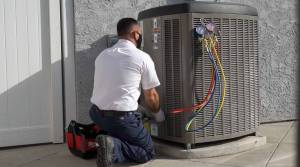Introduction
A properly functioning heating system is the heart of a comfortable home, especially during the cold winter months. It provides the warmth that keeps us comfortable and ensures a cozy living environment. However, like any other appliance, heating systems have a limited lifespan, and there comes a time when a heating replacement becomes inevitable. Making a timely decision about heating replacement is crucial for maintaining an optimal living environment, enhancing energy efficiency, and ensuring cost savings in the long run. According to the U.S. Energy Information Administration, nearly 90% of American households have air conditioning, and a significant number of these households are also equipped with central heating systems. This statistic highlights the prevalence of heating systems in our homes and underscores the importance of keeping them in optimal condition. The primary goal of this comprehensive guide is to walk homeowners through the entire process of deciding on and implementing a heating replacement, ensuring that they make an informed and confident decision.
Recognizing the Need for Heating Replacement
Heating replacement is a significant decision and investment. Recognizing the right time for a replacement is the first step towards ensuring a comfortable and energy-efficient home. One of the most obvious signs that it might be time to consider a heating replacement is the age of your existing system. Most heating systems, whether they are furnaces, boilers, or heat pumps, have a typical lifespan of 15-20 years. As these systems approach or exceed their expected lifespan, their efficiency tends to decline, resulting in increased energy consumption and higher utility bills. In fact, an old heating system can operate at as low as 60% efficiency, leading to substantial energy waste. Another red flag is the frequency and cost of repairs. If you find yourself calling a technician for repairs more than once or twice a year, or if the cost of repairs is starting to add up to half the cost of a new system, it might be more economical in the long run to opt for a replacement. Inconsistent heating, strange noises coming from the system, and an increase in dust and dry air in your home are additional indicators that your heating system might be on its last legs.

Exploring Your Heating Replacement Options
Once you’ve determined that a heating replacement is necessary, the next step is to explore your options. The most common types of residential heating systems are furnaces, boilers, and heat pumps. Furnaces are widely used in the U.S. and work by blowing heated air through ducts. Boilers, on the other hand, heat water to provide steam or hot water for heating. Heat pumps act as a two-in-one system, providing heating in the winter and cooling in the summer. Each system has its pros and cons, and the best choice depends on your specific needs, climate, and budget. The fuel type of the heating system is another crucial factor to consider. Gas, oil, and electric are the most common fuel types, with gas being the most popular due to its availability and lower cost. However, the availability of fuel types can vary depending on your location. Energy efficiency is another critical factor in the decision-making process. Modern heating systems are far more efficient than their older counterparts, and opting for a high-efficiency model can result in substantial energy savings. For example, upgrading to an Energy Star-rated furnace can improve efficiency by 15-20%, resulting in noticeable cost savings on your energy bills.
Understanding the Heating Replacement Process
The process of heating replacement involves several critical steps, and understanding these steps can help ensure a smooth transition to your new system. The first step is selecting a qualified and reputable contractor. This is perhaps the most crucial step in the process, as the contractor will play a significant role in determining the success of the replacement. Once you have selected a contractor, the next step is obtaining a detailed and written estimate. This estimate should include everything from the cost of the new system and installation to any additional work that might be required. After you have reviewed and accepted the estimate, the contractor will proceed with the installation. The installation process can take anywhere from a few hours to a few days, depending on the complexity of the job. During this time, it’s crucial to ensure that you have a clear understanding of the work being done and that all of your questions are answered. After the installation is complete, the contractor should provide a thorough walkthrough of the new system, explaining its operation and maintenance requirements.
Maintenance and Care Post-Heating Replacement
Investing in a new heating system is a significant decision, and it’s crucial to ensure that your investment is protected through proper maintenance and care. Regular maintenance not only ensures the longevity and efficiency of your heating system but also helps prevent unexpected breakdowns and repairs. Homeowners can perform some maintenance tasks, such as changing air filters regularly and ensuring that vents and ducts are free from obstructions. However, it’s also important to schedule regular professional maintenance checks. These checks can help identify and address minor issues before they become major problems, ensuring the smooth operation of your heating system. Additionally, a well-maintained heating system operates more efficiently, which can result in energy savings and reduced utility bills.
Conclusion
Heating replacement is a substantial decision that requires careful consideration and planning. Recognizing the signs that your heating system needs replacement, understanding the available options, and ensuring proper installation and maintenance are all crucial steps in the process. Making an informed decision can lead to improved comfort, enhanced energy efficiency, and substantial cost savings in the long run. This comprehensive guide aims to provide homeowners with the knowledge and tools they need to navigate the heating replacement process confidently. Remember, when it comes to heating replacement, taking the time to make the right decision can result in years of comfortable and efficient home heating.



